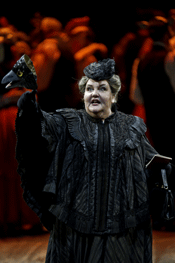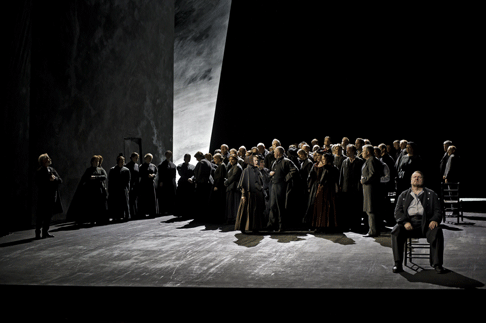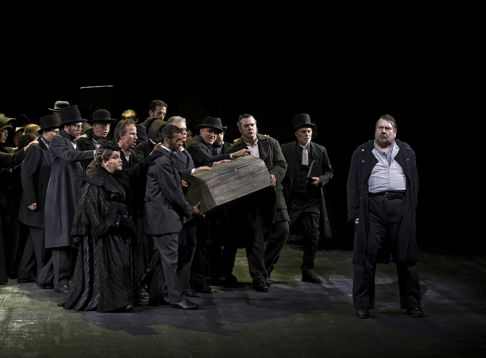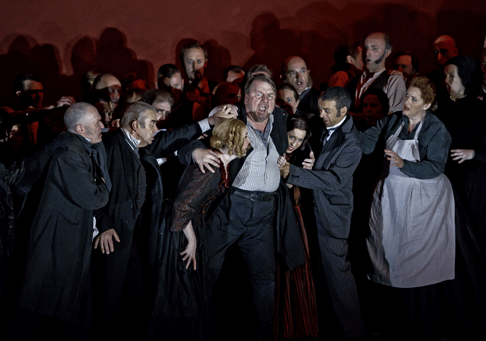23 Jun 2011
Peter Grimes, Covent Garden
Willy Decker’s production of Peter Grimes, first seen at Covent Garden in 2004, should perhaps be renamed The Borough.

Willy Decker’s production of Peter Grimes, first seen at Covent Garden in 2004, should perhaps be renamed The Borough.
For in this reading, it is Britten’s powerful choruses which really excite and dominate: a frightening embodiment of Victorian moral hypocrisy and viciousness, the grey-costumed mob ebb and flow, an amorphous mass exerting an oppressive and irresistible moral force.
There’s nothing inherently wrong with this reading, for Britten’s opera contains astonishingly virtuosic ensembles which erupt in Verdian climaxes. Think of the intricate polyrhythms of the shanty, ‘Old Joe has gone fishing’, where the lop-sided 7/4 tempo aptly conveys the community’s struggle both to resist the storm raging outside the tavern and to quell the disturbances caused by Grimes’ presence within. However, something of the rich diversity of the community, and thus of the opera’s colour palette, is lost. At times, the stage seems over-populated and the incessant movement can be messy and distracting; and, it’s hard for the colourful cast of minor roles to emerge with clarity from the crowd. Even in the Prologue, when Grimes is called to account for the apprentice’s death, Matthew Best’s Swallow struggled to contain the baying throng and to assert his authority despite his well-focused voice and confident stage manner.
 Jane Henschel as Mrs Sedley
Jane Henschel as Mrs Sedley
Some of the cast did manage to rise above the multitudes. Roderick Williams was an engaging Ned Keene, his warm tone and lyricism often suggesting a less antagonistic attitude towards Grimes – a much needed counterpoint to the pack’s pitiless cruelty. Martyn Hill’s Rector came effectively to the fore without strain, while Balstrode’s sincerity and authority was well captured by Jonathan Summers. Although Decker’s Mrs Sedley lapses into caricature, Jane Henschel cleverly suggested the latent power she exerts; seated stony-faced at the front of the stage, impervious to the taunts and ridicule of the drinkers in the tavern scene, she later becomes the driving force behind the persecution, leading the community in the unquestioning conformity. Moreover, in an unusually striking presentation of these minor female roles, Auntie (Catherine Wyn-Rodgers) and her two Nieces (Rebecca Bottone and Anna Devin) provided a welcome splash of visual and vocal colour in the tavern scene.
Amanda Roocroft tried hard to inject some warmth and tenderness into what is a rather severe interpretation of Ellen Orford, the village school mistress who yearns to save Grimes from the Borough’s tyranny and from his own inner demons. In a typically strong characterisation, Roocroft was imposing in the face of the community’s onslaught and criticism, using lyricism to oppose their callousness. However, dramatic strength was sometimes achieved at the expense of clear diction and musical accuracy, and an overly wide vibrato at times resulted in a slightly unfocused tone.
 Prologue, Ben Heppner as Peter Grimes
Prologue, Ben Heppner as Peter Grimes
But, the real problem with this production is that the fate of its protagonist is never in doubt. There is not ‘conflict’ so much, between the outsider and the community, as total alienation. Estranged and unapproachable from the start, distressingly obsessed with the child’s coffin when Ellen tries to call him away, this Grimes is totally isolated and impossible to ‘save’: in Act 3 he simply covers his head (mimicking his apprentice’s earlier gesture of fear) when Ellen and Balstrode attempt to reach out to him. However, the libretto avows his intent to earn enough money to marry Ellen – he wants to win her respect and not just her pity – and to win acceptance by the community: and, it is hard to believe in this declaration or to understand why anyone would want acceptance from this community.
Ben Heppner certainly conveyed Peter Grimes’ existential despair. He is clearly a victim, and his obvious guilt and remorse should earn our forgiveness. Yet even during his visionary soliloquies and angry counter-attacks, Heppner struggled to retain his place at the centre of the audience’s vision. Moreover, there were major vocal concerns. His duet with Ellen in the Prologue was marred by poor tuning and frequently, as in ‘What harbour shelters peace?’ where the soaring minor ninths recall the tentative optimism and yearning of the Prologue duet, the voice sounded gravelly and strained. Short fragmented phrases and a rough-hewn quality created a sense of breathlessness and unease, but there was no sense of Grimes’ inner lyricism.
 (Left to Right) Jane Henschel as Mrs Sedley, Roderick Williams as Ned Keene, Matthew Best as Swallow, Alan Oke as Bob Boles, Stephen Richardson as Hobson, Martyn Hill as Rector, Ben Heppner as Peter Grimes
(Left to Right) Jane Henschel as Mrs Sedley, Roderick Williams as Ned Keene, Matthew Best as Swallow, Alan Oke as Bob Boles, Stephen Richardson as Hobson, Martyn Hill as Rector, Ben Heppner as Peter Grimes
So many of Grimes’ numbers, originally designed to suit and enhance the vocal characteristics of Peter Pears, are mercilessly exposed; and in ‘The Great Bear’ Heppner could not control the floating head voice required. The descending scales, which convey the futility of Grimes’ hopes that he will turn the skies back and ‘begin again’, were woefully flat. Since so much of the drama is conveyed through harmonic conflicts and relationships, this was both musically dissatisfying and disrupted the dramatic arguments of the work.
These five performances at Covent Garden are dedicated to three recently deceased tenors, each of whom has stamped their own identity on a role defined for so long by Pears: Philip Langridge, Anthony Rolfe-Johnson and Robert Tear. Neither Decker nor Heppner present us with a Grimes to challenge these forebears. Decker’s Grimes does not even look like a fisherman! More importantly, in this opera so much depends on ambiguity (‘perhaps you’re not to blame that the boy died’, says Balstrode): we look in horror but we understand, we shudder but forgive, and this delicate balance between opposing forces – dramatic and musical – needs to be sustained. Decker’s vision is powerful in its clarity but loses the dramatic tension that such ambiguity bestows.
Finally, it is a vigorously anti-religious production, a reading that is perfectly justified by the text and complements the Victorian updating. But, of Britten’s desire “to express my awareness of the perpetual struggle of men and women whose livelihood depends on the sea”, there is little acknowledgement – apart from some Turner-esque backdrops. As the curtain rises in Act 1, the orchestra paints a picture of the dawn labours of a community dependent on the sea: ripples in the clarinet depict the glitter of the rising sun on the tossing waves; a high, ornamented melody recreates the dips and dives of a soaring gull; surges in the brass announce the ocean’s threatening undercurrents. The chorus sing of the duties which draw the fishing families together in hardship, perseverance and solidarity. Decker presents us with a church congregation, literally singing from the same hymn sheet – but the rhythms are those to accompany the hauling of nets and the tugging of sails. Although this dramatic motif returns in a powerful gesture in the closing moments of the opera – as, defeated, Ellen reluctantly takes her place among the worshippers, covering her face with the hymn sheet, to erase her identity and resistance – it sits awkwardly with the musical drama.
 (Left to Right) Alan Oke as Bob Boles, Jonathan Summers as Balstrode, Anna Devin as Second Neice, Ben Heppner as Peter Grimes, Rebecca Bottone as First Neice, Roderick Williams as Ned Keene, Catherine Wyn-Rogers as Auntie
(Left to Right) Alan Oke as Bob Boles, Jonathan Summers as Balstrode, Anna Devin as Second Neice, Ben Heppner as Peter Grimes, Rebecca Bottone as First Neice, Roderick Williams as Ned Keene, Catherine Wyn-Rogers as Auntie
John Macfarlane’s set is visually impressive; steeply raked walls and a tilted stage increasing the sense of claustrophobia and repressed chaos. And, conductor Andrew Davis certainly drives the pace incessantly forward with a real sense of urgency and passion, even if he does not always achieve the required fullness of texture and depth of resonance. But ultimately there are too many compromises, and the cast, especially Heppner, are not quite strong enough to make Decker’s vision convincing.
Claire Seymour